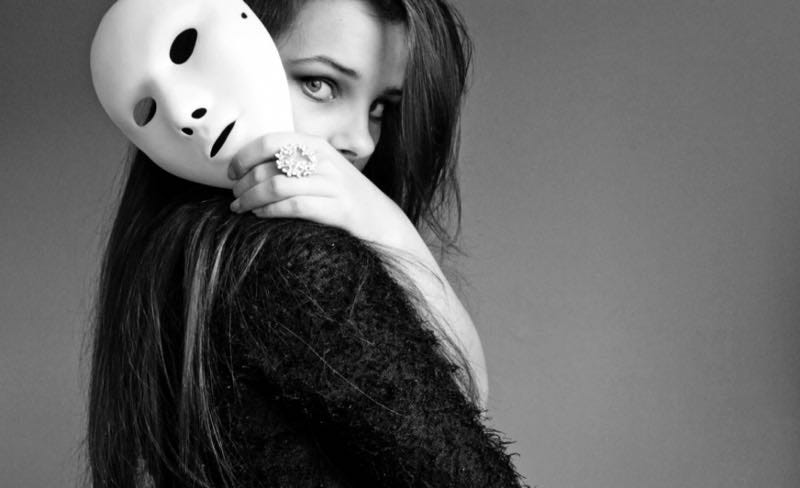Donald Winnicott is considered to be one of the greatest thinkers from the 19th century in the field of psychoanalysis. Winnicott came up with the concept of the true self and the false self. I'm sure without it being explained, you know who the true and false self are: you have a real you and a fake version, we all do.
Winnicott's work of true self vs false self was expanded upon by many psychologists and was particularly useful when studying narcissism. That isn't to say that only narcissists have a false self, everyone does, however, some of us "live" in our false version longer than others. And some of us have worse, more ridiculous false selves than others do. While definitions vary amongst psychologists, it's agreed that the false self is a facade, and therefore a deceptive outward appearance. While the true self, is well, self-explanatory. It's the real you.
The fact is, you know when you are being true and when you are not. Being false takes effort while being true doesn't. The real you, just flows.
I don't think it's useful trying to analyse the semantics of how various psychologists and philosophers defined the true self vs false self. However, what is useful to think about is: why do you have a false self, when are you your false self, and do you want to be your false self.
Who is your false self?
Think for a minute and ask yourself when did your false self last appear? Maybe when recording a video for social media in an effort to gain attention. Or perhaps you work in the service sector which means 5 days a week pretending to be cheery, when in fact you're not and hate your job.
For me, it was a few days ago when attending my weekly one-to-one meeting with my boss. My false self appeared for 30 minutes (the duration of our meeting), and in that time I pretended to be enthusiastic about my work, and the amount I'd accomplished. If my true self had shown up by mistake, it would have been a disaster. Our chat would have been me telling my boss that I can't stand my job, that I've been doing the bare minimum, and that my main accomplishment was installing a piece of freeware Windows software that moves my mouse every 5 minutes.
Watching a bad film
Everyone has watched a bad film where the acting is terrible. You can't get into the plot because it's hard to take the characters seriously. Here's the thing, when you are your false self, everyone knows it. It's like watching a bad film. With you playing the lead role with abominable acting skills.
What's strange is that we're so used to seeing people as their false self we don't find it unusual. Think back to the last time someone gave you a false smile, maybe on an aeroplane, or a fake laugh in the workplace. You know it's fake -- they are not happy to see you and they certainly didn't find your joke funny.
We're genetically programmed to be able to read body language. We look for facial and behavioural cues and quickly evaluate their meaning. We know instantly when something is off -- how you speak, the tone of your voice and facial expressions are different. How we act when we're genuinely happy comes subconsciously, and when we try to fake it, it's like watching a bad film. Just like the example below taken from the Instagram Reality subreddit of someone filming themselves for social media.
It's comical when we see the "fake happy" content creator being filmed but her video becomes less ridiculous when she hits upload and it appears on social media timelines. Her fake acting blends in with all the other fake content being published on social media. Just as we've become desensitised to ludicrous politics and politicians, the same can be said about fake personas, we've become so overexposed to people being fake -- it's become normalised.
Watching a good film
Whenever I watch someone on TV or Youtube, I take an instant dislike (despite not knowing them), when they are not being themselves (their fake version). Many celebrities have created a fake persona that comes to life whenever a camera is pointed at them -- they are trying to convince an audience that this is their true self, however, that true person lives hidden behind the scenes.
Some celebrities flip-flop between their true and false self. The world heavyweight boxing champion, Tyson Fury springs to my mind. In some interviews, he comes across as incredibly likeable when he's being true and on other occasions, he comes across as idiotic and dislikable. The latter often occurs when a fight is being sold, so his deceptive outward appearance is called upon. The truth is, we often see someone's false self when we are being sold something.
Conversely, and I don't think I'm unique here, I take an instant liking to those that are being true. Just as it's easy to spot when someone is being their false version, the same applies when someone is being true. You instinctively know the person is being honest, which makes them engaging -- it's like watching a good film.
I've always thought that if politicians broke the mould of being fake all the time, and were radically honest, owned up when they were wrong, didn't avoid questions and apologised when they messed up that they would be significantly more popular and electable. People see you as human when you are being honest, and alien when you are not.
False self platforms
The fact that we have two personas is nothing new; our grandparents and their parents had false selves too. What is new, however, is that we live in a time where our false self gets to exist as long, if not longer than our true version. Facebook, LinkedIn, Insta, TikTok ..you name it, even WhatsApp 😂 -- all encourage fakeness. It's a place for our false selves to hang out.
Being your fake self at work is understandable, especially if you are customer-facing. The office is one big charade where everyone is expected to be fake too. So putting on a fake face 9-5 is to be expected. We all know that's not the real you. Being fake in your spare time is a different kettle of fish though.
"The social media maven spends his or her time creating a self-caricature, a much happier and more photogenic version of real life. People subtly start comparing themselves to other people’s highlight reels"
David Brooks, The Road to Character
In The Road to Character, the author David Brooks documents how our culture has lost the value of humility and has moved to one of self-promotion and self-preoccupation. I'm sure deep down most people when given a choice would rather live an authentic life, however, we live in a time where inauthenticity is encouraged and authenticity is in scarce supply.
Hierarchies
Why do we have false selves? The best answer I can come up with is because of hierarchies. Many anthropologists believe that we spent most of human existence as part of egalitarian hunter-gather societies. Therefore, there wasn't a single leader or alpha male that ran the tribe.
In an equal environment there are far fewer people to impress so there's less of a reason for a false self to appear. However, following the Agricultural Revolution, this all changed. In a world with land owners, employers, and wheat fields, it meant hierarchies naturally evolved.
Fast-forward in time and we're now in the third (going on the fourth) phase of the Industrial Revolution. Hierarchies are omnipresent and everyone is trying to "get ahead".
In its most obvious form, people are their false selves in careers in an effort to impress the hierarchy and get paid more. On social media, people are false in an effort to accrue more social currency (likes, views, and followers) which puts them further up the social ladder.
Being false is an attempt to accumulate more resources, appear more attractive, or increase social status. At its root, all human behaviour can be explained by two things: sex and survival. It's these two genetic "needs" that manifest themselves into all kinds of peculiar activities and behaviours. Nothing else explains our hunger for attention that only social media can satisfy.





